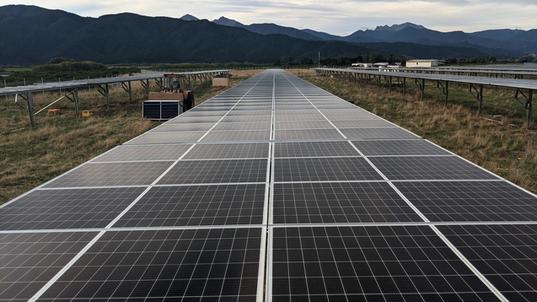The world has no time to wait to rapidly decarbonize, and the International Energy Agency (IEA) estimates that improvements in energy efficiency can deliver over 40% of the greenhouse gas emissions reductions needed to meet global climate goals. Unfortunately, the near-term opportunities offered by investing in efficiency are still too often overlooked by corporates now planning for net zero.
Climate Group’s EP100 initiative is a network of 129 major global companies who are ahead of the curve and have already placed energy efficiency at the heart of their sustainability strategies. Together they have a combined revenue more than US$500 billion and two million employees, operating across more than 130 markets worldwide.
By making public commitments to increasing their energy productivity, and reporting transparently on their progress, EP100 members demonstrate the potential of investing in smarter energy use. In the 2020 EP100 annual report, members had a combined annual cost savings of US$200 million with investments in smart energy use and avoided 328 million metric tons of CO2e to date, more than the annual emissions of France.
Fourteen EP100 members with a large footprint in the North American market met in July to examine local and global opportunities, challenges, and solutions to achieving their energy efficiency goals.
Toby Morgan, the new Senior Manager for the Built Environment at the Climate Group, provided welcoming remarks and emphasized the importance for a regionally focused meeting. “We are seeing extreme weather in North America, with record temperatures and wildfires showing that we could be at a climate tipping point and the world needs to act fast.”
To avoid the worst impacts of climate change, we are accelerating the pace of getting to net zero emissions, as Clay Nesler, the Global Lead for Energy and Buildings at the World Resources Institute, and headline speaker, said: “[climate change] is the most pressing issue on our planet. Any serious strategy for net zero must include energy efficiency as a primary component.” Net zero will be the focal point at upcoming global convenings including Climate Week NYC and the 26th UN Climate Change Conference of the Parties (COP26).
At the meeting, members shared experiences and identified challenges they are addressing to reach their energy efficiency goals. The challenges they shared focus on the following four issues:
- Aligning energy efficiency goals between owners and occupiers
Collaboration between owners and occupiers is crucial to unlocking the full energy savings potential of buildings and accelerating achieving net zero goals through partnerships. - Implementing small-scale energy efficiency measures across leased spaces
Members have different strategies for implementing smaller scale efficiency measures across multiple facilities, especially in leased spaces where there is less direct control and visibility on energy usage. - Predicting emission factors and their impact on energy efficiency measures
As companies introduce green energy mixes in alignment with their decarbonization strategy, predicting the future carbon savings can make it difficult to know when companies should invest in deep energy efficiency measures. - Reducing cost barriers to energy efficiency
Deep energy efficiency measures may require complex analysis and a large burden of proof to support the case for taking such measures compared to other no or low-cost measures for reducing a company's carbon footprint.
Members cited strong leadership support for setting targets that prioritizes executing on public commitments to energy efficiency as an essential enabling factor to achieving their goals. By allowing their teams to creatively address challenges in facilities management and operating expenses, companies will reap the benefits of cost and emissions savings offered by energy efficiency.
EP100 corporate members also took a closer look at the owner-occupier (or “split incentive”) challenge and shared three insights for addressing it in small discussion groups.
- Facilitate communication of decarbonization goals between owners and occupiers
When owners and occupiers communicate their decarbonization goals and interests with each other they can explore the shared benefits of converting buildings to renewable electricity and implementing energy efficient measures together. Through collaboration, owners and occupiers work together for smarter energy use and implement behavior change with net zero carbon benefits. - Champion robust energy submetering in buildings
By submetering spaces, owners and occupiers can track their energy efficiency progress while also increasing engagement and visibility of net zero actions and reducing energy costs. - Engage smaller-sized occupiers in net zero and energy efficiency goals
Often smaller-sized occupiers cover a larger portion of square footage overall and perhaps do not have the same capacity as larger-sized occupiers to incorporate an energy efficiency lens into their decarbonization goals. Targeted engagement strategies for large and small-sized occupiers creates more opportunities for owners and occupiers to work together on their decarbonization and energy efficiency goals.
Energy efficiency is the first fuel of a sustainable global energy system and can deliver transformative results for getting to net zero emissions. EP100 member companies are leaders in smart energy use, integrating ambitious energy efficiency targets into their business strategies, thereby increasing their competitiveness, and decreasing carbon emissions.
Every company should have an energy efficiency target embedded into their business plan. In addition to enabling a faster shift to renewables, energy efficiency improvements add enormous value to global GDP (Gross Domestic Product) and boost companies’ bottom lines. An energy efficient approach to net zero goals is one of the most cost-effective emission reductions techniques between now and 2030.
In North America, EP100 will continue to grow corporate membership as more companies learn from the leadership of current members and commit to energy efficiency. If your company has a decarbonization strategy, energy efficiency is a good place to start your net zero journey and we encourage you to learn more about EP100 and joining this network of leading energy smart companies.
Contact us at [email protected] to learn more about EP100.
